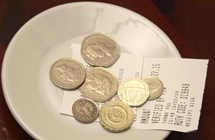长假出游贴士:世界各国是如何给小费的
|
It is a dilemma every holidaymaker has faced while dining out overseas: should you leave a tip? While tipping is customary in most Western nations, in other parts of the world, tourists risk offending staff if they leave money on the table after the meal. It can also lead to overspending on a holiday budget as a tip can add up to 25 percent to any meal out.
New research from the Good Housekeeping Institute reveals where in the world you should expect to tip, and how much is an acceptable amount to leave. Sara Benwell, Consumer Editor at Good Housekeeping, said: 'In Japan, there is a no-tipping culture, and you may offend your waiter if you try to give him some money, while in America, tips are very much expected, and it's rude if you don't leave anything. 'In France, the service charge must be included in the bill by law. However, many locals will also leave some coins as an extra sign of appreciation.' She pointed out that failing to factor in tips to your holiday budget can quickly add to the cost of your holiday as you not only have to spend more, but might also be faced with overseas card charges and poor exchange rates when you try to make up the shortfall. In Germany, Italy and India, it is polite to leave staff 10 percent of the total bill. Perhaps unsurprisingly, the US tops the list of the biggest restaurant tip, with wait staff expecting to be left between 10 and 25 percent of the total bill. American taxi drivers also expect a little extra, although there is no fixed amount. Tipping is not expected in many South East Asian countries, although it is a polite and easy way to show your appreciation for good service and is greatly received. However in Japan and China, tipping in restaurants and taxis are both frowned upon and should be avoided. |









